Globalization & tradition: how to have the best of two worlds
Before getting into details about the LATAM market, it’s important to mention that globalization also had an effect on special shopping dates. Events like Black Friday and Cyber Monday were imported from the United States and are now celebrated worldwide, including Latin America. In most cases, LATAM countries follow the original U.S. dates: Black Friday on the day after Thanksgiving (celebrated on the fourth Thursday of November) and Cyber Monday on the following Monday.
In Brazil, for example, Black Friday online sales generated 2.1 billion Brazilian reais in 2017 and in 2018, considering the period between the Thursday before Black Friday and Cyber Monday, there were 6.9 million checkouts completed during the five days of the “Black Week”.
In parallel to these two dates, there is also the interesting crossover market case of Double Eleven, a date imported from China (celebrated on November 11th, also known as Singles’ Day) that is making an impact in Brazil.
Follow the (double) yellow brick road
So, in what concerns special shopping dates, companies have two roads to follow and no obligation to choose just one. In fact, combining the two might be the pot of gold on the other side of the rainbow.
In one hand, increased internet connectivity and a growing number of mobile users in LATAM is making space for these imported shopping dates – information and inspiration are only a click away – expanding the possibilities for companies to make a profit. On the other hand, you can always count on globally cherished dates like Mother’s Day, Father’s Day, Children’s Day, Valentine’s Day and the Back to School Season, to promote special campaigns. Just be aware that, in both cases, these special shopping dates might fall on a different calendar day depending on the country. For example, in Latin America, the Back to School Season falls between February and March. In the USA and Europe, it happens in September.
Also, take into consideration the power of local tradition. For instance, Children’s Day isn’t officially celebrated in the USA, but it’s transversally loved in LATAM – most Latin American countries dedicate a fixed calendar day to it.
Brazil
Besides the already mentioned Black Friday and Cyber Monday, Consumer’s Day is also an international event gaining ground in Brazil. It’s always celebrated on a Wednesday in mid-March.
Other special shopping dates in Brazil:
- Mother’s Day – second Sunday of May
- Valentine’s Day – June 12th and it celebrates a different saint, Saint Anthony
- Father’s Day – second Sunday of August
- Children’s Day – October 12th
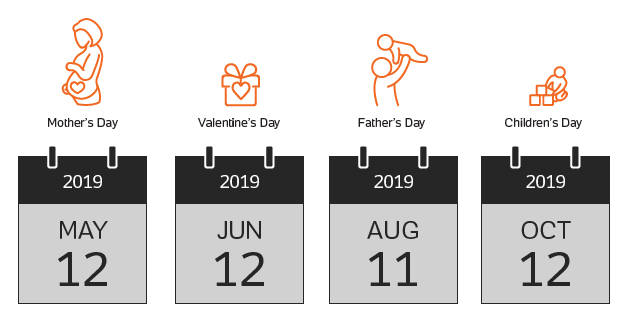
Mexico
Unlike Brazil, that more or less follows the same special shopping dates as the rest of the world but on different calendar days, Mexico celebrates two specific events to its culture: El Buen Fin and the Cinco de Mayo.
El Buen Fin is an abbreviation for El Buen Fin de Semana (The Good Weekend) and it’s Mexico’s equivalent to Black Friday. This event was created in 2011 by a group of Mexican associations – from the Council of Business Coordination to the Bancos de México’s Association and the Mexican Internet Association – with the purpose of stimulating the country’s economy by encouraging consumption with special prices, promotions and extended credits. It’s celebrated on the weekend before the Mexican Revolution Day, which falls on the third Monday of November.
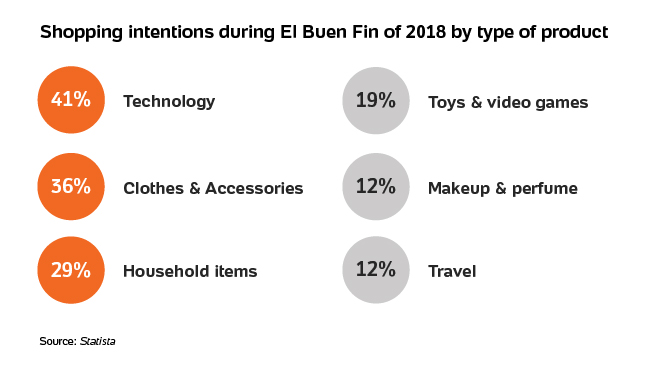
The Cinco de Mayo celebrates the victory of the Mexican Army against French troops in the city of Puebla in 1862. It’s also a very important date for Mexicans living in the USA, opening the opportunity for companies to launch campaigns in both countries.
Other special shopping dates in Mexico:
- Valentine’s Day – February 14th
- Children’s Day – April 30th
- Mother’s Day – May 10th
- Father’s Day – third Sunday of June
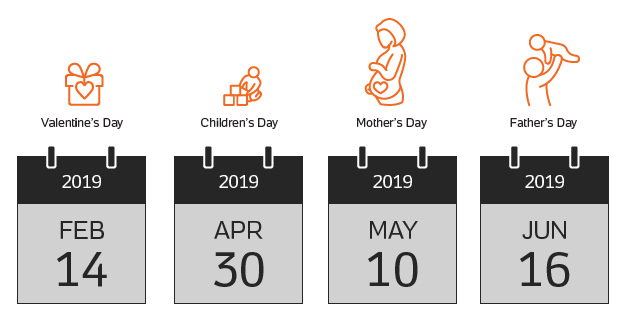
Argentina
In Argentina, one of the most profitable special shopping dates is Cyber Monday. In 2018, the online sales revenue for this day reached 7.2 billion Argentine pesos, an increase of 2 billion pesos when compared to 2017.
Valentine’s Day is also a strong date, especially because it’s celebrated twice. Argentinians celebrate on February 14th like Mexico and the USA but also have a national version of this date called Sweetness Week. It’s celebrated in July and during that week the tradition says you have to exchange kisses for sweets. It was originally created as a marketing campaign for the confectioner’s industry but eventually, it was adopted as a national holiday.
Other special shopping dates in Argentina:
- Father’s Day – third Sunday of June
- Children’s Day – third Sunday of August
- Mother’s Day – third Sunday of October
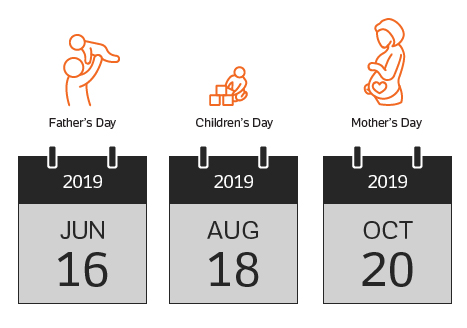
Colombia
Colombia has a similar tradition to Argentina in what concerns Valentine’s Day. Although unlike Argentinians, Colombians don’t really pay attention to February 14th, they also have a national equivalent of Valentine’s called Día del Amor y la Amistad (Love and Friendship Day) celebrated on the third Saturday of September.
Special shopping dates in Colombia:
- Children’s Day – last Saturday of April
- Mother’s Day – second Sunday of May
- Father’s Day – third Sunday of June
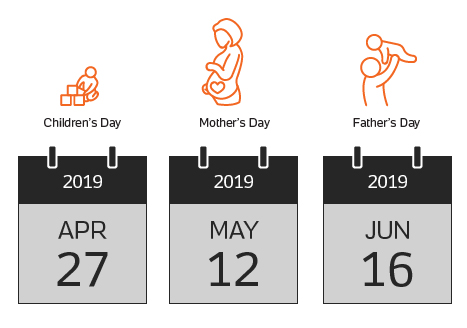
Peru
Valentine’s Day has been a national holiday in Peru since 2012. Like in Colombia, the date is also extended to friendship and not just romantic love. So, take note that Peruvians are not seduced by the usual Valentine’s imagery: hearts, red roses and teddy bears. For example, the flower associated with Valentine’s Day in Peru is the orchid.
It’s also important to mention that it’s summer in Peru during this time of the year and that Valentine’s Day celebrations merge with Carnival, making it a weekend of joy, dancing and a lot of outside festivities. So, keep in mind that the spirit of Valentine’s Day in Peru is a lot different from the U.S. and Europe.
In what concerns native holidays, Independence Day is the most influential. It’s celebrated on July 28th and 29th and it marks the independence of Peru from Spain.
Other special shopping dates in Peru:
- Children’s Day – last Saturday of April
- Mother’s Day – second Sunday of May
- Father’s Day – third Sunday of June
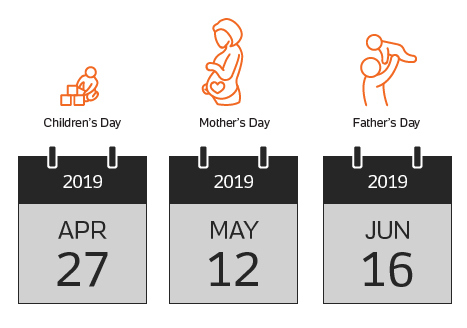
Chile
Chile has a surprising number of national holidays. Many are connected to religion, combining Catholic Spanish and Indian traditions, but others are linked to the country’s history. The most important of the latter is Independence Day or Fiestas Patrias. Like in Peru, this day commemorates Chile’s independence from Spain and is celebrated on September 18th.
Other special shopping dates in Chile:
- Valentine’s Day – February 14th
- Mother’s Day – second Sunday of May
- Father’s Day – third Sunday of June
- Children’s Day – second Sunday of August
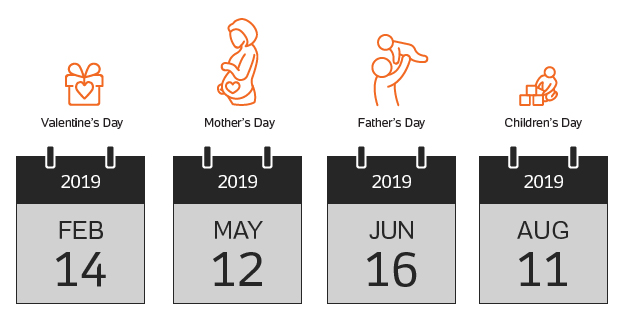
Uruguay
Like Peru and Chile, Uruguay also has an Independence Day. In this case, it commemorates Uruguay’s independence from Brazil in 1825. It’s celebrated on August 25th.
Other special shopping dates in Uruguay:
- Valentine’s Day – February 14th
- Mother’s Day – second Sunday of May
- Father’s Day – July 19th
- Children’s Day – second Sunday in August
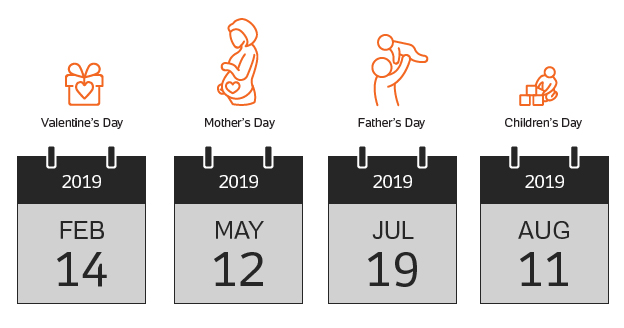
All of the above-mentioned countries are Catholic and give a lot of importance to religious dates. All celebrate Christmas, Easter and the Day of the Dead, for example, apart from having a lot of days dedicated to specific saints. These dates weren’t referred because Christmas is by itself a privileged shopping period and doesn’t really need special campaigns; unlike the U.S. and Europe, where these holidays have gained a more commercial spirit, in LATAM, Easter and the Day of the Dead are still very connected with religious rituals and trying to market them into shopping material might be a delicate, unnecessary and unsuccessful plan.
How to prepare to win your pot of gold
One more important note to finish. In order to be successful with campaigns for special shopping dates, you must think ahead:
- Know your market and its specificities.
- In the cases of retail, cosmetics, electronics, toys, household items and other similar items, make sure you have enough product in stock to respond quickly to the increased demand and expectations for a speedy delivery – consumers want to receive their products in time to offer them within the date in question.
- Make sure your strategy involves all platforms in an equally effective way – consumers can be checking the promotions on their smartphone, tablet or computer, depending if they are at home or during lunch break at work, for example.
Ready to start now? Get in touch with us to learn how BoaCompra can help your company expand to this promising market:




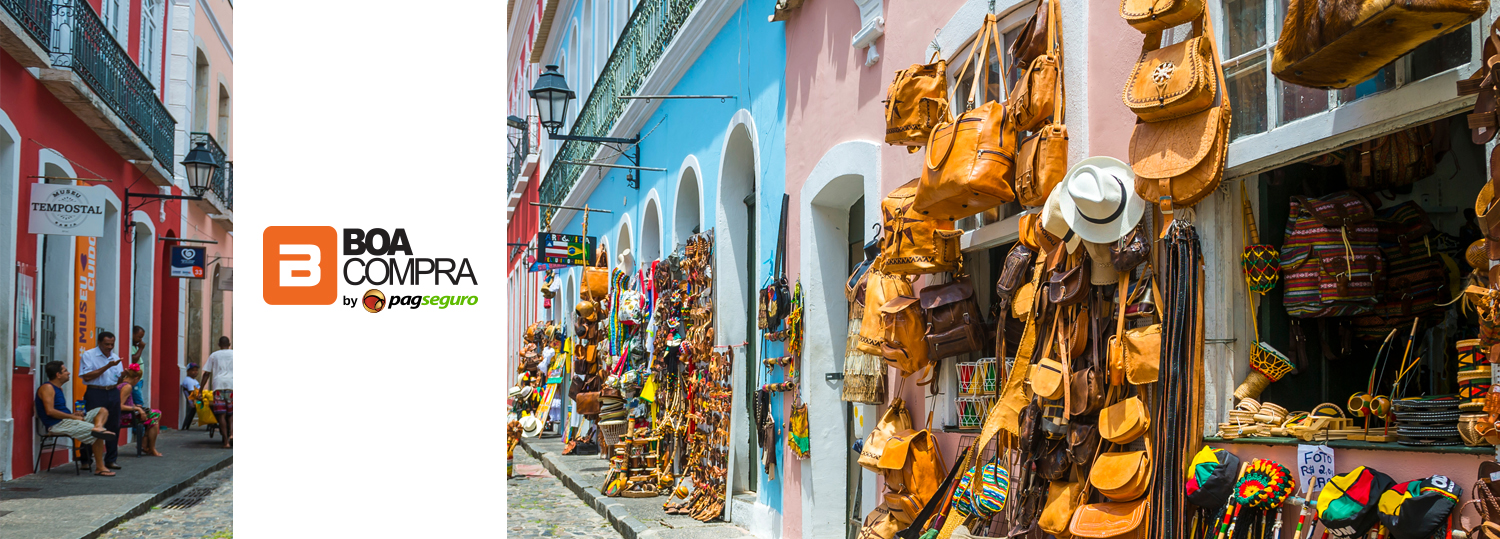
.jpg)
